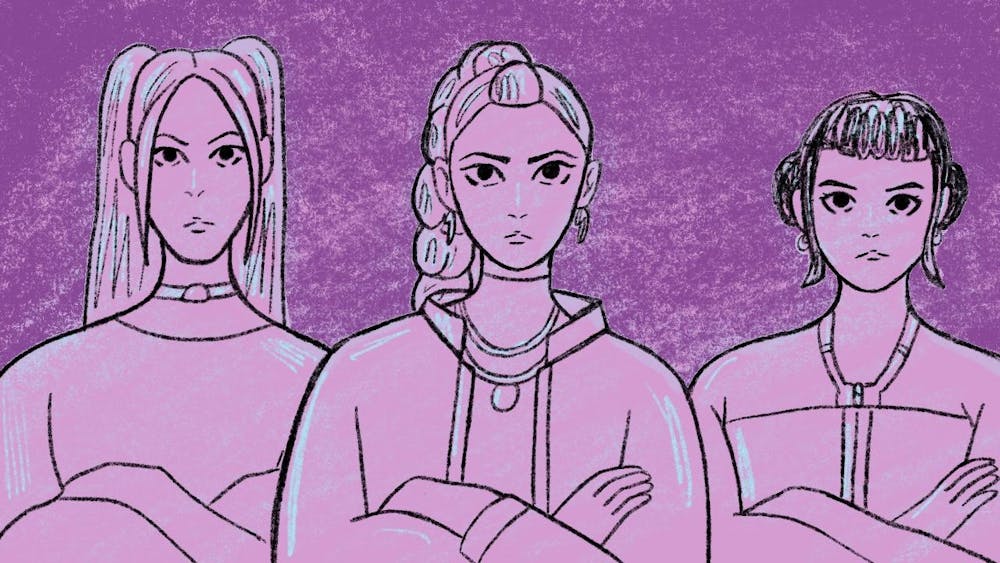Disclaimer: This article contains spoilers to the movie “KPop Demon Hunters”
Which Saja Boy is your favorite? Many fans choose to throw themselves into the arms of the heroic frontman Jinu or the mystique of — you guessed it — Mystery. Personally, I’m on Team Bobby, but I digress.
This question has echoed throughout the world since the release of the movie “KPop Demon Hunters” on Netflix in June 2025. The movie quickly became Netflix’s most watched movie and ignited a fire within fandom culture; K-pop and cartoons are notorious for having devout followings, with “KPop Demon Hunters” being no exception to this pattern. As a result, an overwhelming section of the fandom developed a fixation on the fictional boy band, the Saja Boys. Countless pieces of merchandise have been sold, fan art has been drawn and fan fiction has been written regarding the five undercover demons, while the leading ladies of HUNTR/X are put on the back burner.
This shouldn’t be the case, though. The story was created to focus on Mira, Zoey and Rumi and their relationship as they overcome the trials they face – defeating the Saja Boys, sealing the Honmoon and discovering Rumi’s patterns – and emerge as stronger friends who are authentically themselves. It's revolutionary how the creators emphasize the girls’ bond and friendship without relying on men, something most popular media fails to do.
Focusing on the Saja Boys and the romantic subplot of the movie subverts the entire premise of the film. Fans even complained about the movie's resolution when the HUNTR/X members were relaxing in the bathhouse, because it seemed as if Rumi completely “moved on” from Jinu. It's as if people were upset to not see a woman broken after the death of her love interest, despite the short time Jinu and Rumi knew each other and the success that Rumi was now able to celebrate. By not showing Rumi in despair long after Jinu’s death, the creators show that women can gain fulfillment in life from things other than men, such as friendships and professional lives, driving home the main point of the movie.
Unfortunately, “KPop Demon Hunters” is not the first movie to get this treatment, and it certainly will not be the last. Similar behavior from fans could be seen during the 2010s when “The Hunger Games” was maddeningly popular. Fans constantly argued over being Team Gale or Team Peeta, and (despite the choice being obvious) kept this discourse at the forefront of the fandom, overshadowing the crucial themes of the novel regarding authoritarianism and class division. The discussion of men lessened the impact of the dystopian novel, reducing it to a “silly teen girl book” in some cases, despite the heavy themes and insight the author provided.
All of this is not to say that you cannot enjoy a male character in a film or the romantic subplot, but we as media consumers must be mindful of boundaries and do our parts to understand what we digest. There is nothing wrong with having a favorite Saja Boy (or Bobby), as long as you understand what the premise of the film is and don't let romance overpower that message.
“KPop Demon Hunters” strikes a solid balance between its core message and its supporting characters and plot. It keeps the girls’ relationship and their mission to defeat the demons as the central focus while still developing other elements of the story. The film doesn't sacrifice its message for the sake of providing more detail, and vice versa.
Above all else, it ensures that the relationship between HUNTR/X remains at the heart of the movie. So, at the end of the day, Rumi should be able to enjoy the bathhouse with her girls without worrying about Jinu. The romantic subplot and the presence of the men in the film are not entirely irrelevant, but, at the end of the day, the movie is intended to be about HUNTR/X and their dynamic. Focusing on men who don't even have names completely subverts the message and is a success for both Gwi-Ma and the patriarchy.



